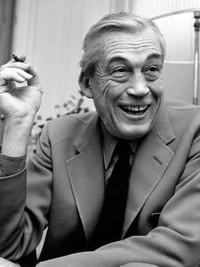John Huston

Without a doubt one of the most influential, prolific directors of any era, John Huston's reach spanned several decades and numerous film genres that displayed vast imagination while focusing on characters struggling for individuality despite constraints from the world around them. Huston led quite an adventurous life even before he began his Hollywood career, often recalling his days as a boxer, Mexican cavalry officer and avid horseback rider in many of his films. After a false start as a screenwriter in the early days of talkies, Huston re-emerged in the late-1930s as a successful contract writer who penned such hits as "The Amazing Dr. Clitterhouse" (1938), "Sergeant York" (1941) and "High Sierra" (1941). During this time, he developed a strong working collaboration with Humphrey Bogart, who became a major star following his turn in Huston's directorial debut, "The Maltese Falcon" (1941), one of the best film noirs ever made. The two had even greater success with "The Treasure of Sierra Madre" (1948), which earned Huston and his father, actor Walter Huston, Academy Awards. From there, the director entered into what became his most fruitful period, helming such long-held classics as "The Asphalt Jungle" (1950), "The Red Badge of Courage" (1951) and "The African Queen" (1952), which delivered Bogie his only Oscar. He also began acting later in his career, turning in an acclaimed supporting performance in "The Cardinal" (1963) while being best remembered for his portrayal of the vile Noah Cross in "Chinatown" (1974). In the last decade of his life, Huston returned to critical and box office prominence with "Prizzi's Honor" (1985), which earned daughter Anjelica an Academy Award, making the Hustons the first family to win Oscars in three successive generations. As for Huston himself, he left behind a compelling legacy that included an adventurous life and a career that cemented him as arguably the greatest director in Hollywood history.